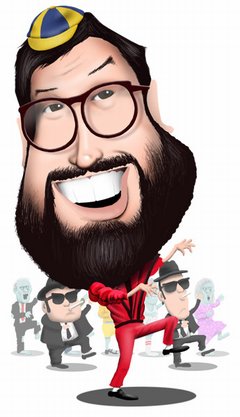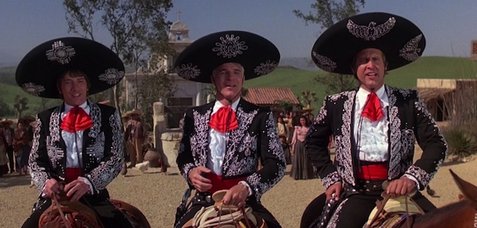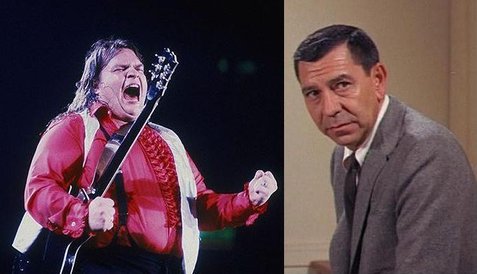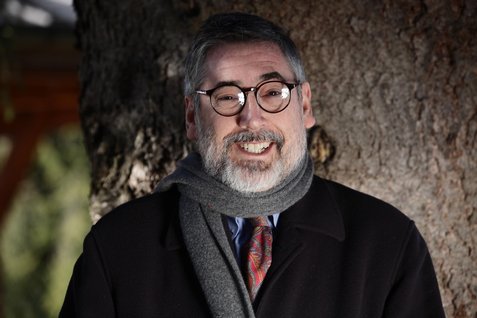There’s no point in writing an intro for our conversation with John Landis when we’ve already given a perfectly serviceable synopsis of the man’s life and times on his page within Bullz-Eye’s Directors Hall of Fame – which you can find right here – but we will say that we’ve been looking forward to chatting with Landis for quite some time. Although his publicist regretfully informed us that he didn’t have time to talk when we were pulling together the Hall of Fame, we’d kept our fingers crossed that we’d get an opportunity to talk to him one of these days, and at last that time has come, courtesy of the Blu-ray release of “¡Three Amigos!,” which hits shelves on Nov. 22nd.

Bullz-Eye: First of all, in case you haven’t heard, I should let you know that we put you into our Director’s Hall of Fame last year.
John Landis: Oh, thank you very much!
BE: Our pleasure. After all, we’re a guy-centric site, and it would be fair to say that you’ve made a few movies that have been appreciated by many a man over the years…including, of course, “¡Three Amigos!”
JL: [Laughs.] So did you get a chance to watch the Blu-ray, then?
BE: I did. It looks fantastic.
JL: Yeah, I was able to restore it to the way it’s supposed to be seen. I’m very pleased with the way it looks.
BE: I was actually going to ask you about that process. I presume there’s at least a little bit of difference when it comes to restoring a comedy for Blu-ray versus, say, a full-on special effects extravaganza.
JL: Actually, no. [Laughs.] That would be an untrue presumption. I mean, every picture’s individual, and it depends on the look you were going for with that particular movie. When they made the Blu-ray for “Animal House,” I was upset. I thought they made it much too bright and clean. “Animal House” is supposed to look dirty and funky. [Laughs.] I remember the technician, when I had to check it, he kept writing on his chart, “Image degraded per director.” But every movie you make, you try – or at least I do, anyway – for a different kind of look. On “¡Three Amigos!” I was really trying to go for those beautiful westerns that Hollywood used to make in the ‘50s. The Technicolor pictures. We wanted the colors to be incredibly vibrant. You know, the old DVD wasn’t even the correct aspect ratio. So I’m happy that I got the chance to restore it.
BE: Well, as I say, it looks fantastic. And sounds great, too.
JL: Yeah, it’s a great score. It’s a unique situation where Elmer Bernstein, I asked him…I said, “Listen, I want you to satirize yourself.” And that’s what he did. [Laughs.] He’s doing his wacky version of “The Magnificent Seven,” and I was just so pleased with that. And the songs by Randy Newman…I mean, the movie’s got incredible music.
BE: And the Singing Bush. I mean, come on…
JL: The Singing Bush is Randy Newman! [Laughs.]
BE: Absolutely. Did you have to prod him at all to play that part?
JL: Yes. [Laughs.] But he did a great job. The role he was born to play!
BE: You and your stars – Chevy Chase, Steve Martin, and Martin Short – reunited for an Empire Magazine article not so long ago.
JL: Right, that was recently. It was only about four months ago, I think.
BE: It was a great article, although as I read it, I couldn’t help but think, “Gee, I’m sure he loved being reminded that ‘¡Three Amigos!’ made less money at the box office than ‘Police Academy 3.’”
JL: Yeah, but ‘Police Academy 3’ was a gigantic hit!
BE: Well, sure. But when you look back on classic films of the ‘80s, ‘¡Three Amigos!’ would seem to rank higher than ‘Police Academy 3.’
JL: Maybe, but…I make a movie that I want to see. When you make a film…Peter Bogdanovich famously said, “The only true test of a movie is time,” and there are movies that were originally failures, like “It’s a Wonderful Life,” which was such a failure that it bankrupted the company, but it’s considered a great American film…because it is! [Laughs.]
BE: You’ve been at the helm of quite a few films that continue to be reflected upon both on and between their key anniversaries. Is “¡Three Amigos!” one that surprises you with its endurance?
JL: No. Because it’s very funny. [Laughs.] And I think that the Amigos themselves are very sweet. And…there are not that many movies you can watch with the whole family, other than Disney or Pixar films, where the parents enjoy it as much as the kids.
BE: I discovered this morning that if I go to Google and type in the words “would you say,” it instantly attempts to finish the phrase with “I have a plethora of piñatas”?
JL: [Bursts out laughing.] Is that true?
BE: That is absolutely true.
JL: That’s…odd. [Laughs.]
BE: But it’s also, I think, a testament to the enduring fan base for that film.
JL: Well, that’s also the wonderful Alfonso Arau and Tony Plana. They’re so great.
BE: Are there any lines that stand out for you personally as favorites?
JL: Oh, many. I think my favorite, the one that I quote the most, is when Dusty Bottoms comes to the Mexican village and the peasants feed them and give them lunch, and Chevy says, “Do you have anything besides Mexican food?” [Laughs.] My wife and I were three months in India, and I found myself saying “do you have anything besides…Mexican food?” all the time.
BE: One of the things I noticed in re-watching the film – something I can’t say as I paid attention to before – was that, in the scene where the Amigos meet with the head of their movie studio, you’ve got three guys working together who would go on to be three of the most popular guest voices on The Simpsons: Phil Hartman (Troy McClure), Jon Lovitz (Artie Ziff), and Joe Mantegna (Fat Tony).
JL: Oh, you know, I never thought of that! [Laughs.] That was Joe Mantegna’s first movie. And Jon Loviz and Phil Hartman, they’re in it because I really wanted Lorne (Michaels) to see them, to put them on “Saturday Night Live,” and…he had a prejudice against L.A. at that time, and because they were from a comedy group in L.A. called The Groundlings, he didn’t want to know. So I gave them parts in the movie so he could see how brilliant they were.
BE: If you listen to Joe Mantegna in the scene, he’s essentially doing his Fat Tony voice.
JL: That’s so funny. That never occurred to me. I didn’t even make that connection. Did you watch the cut scenes on the Blu-ray?
BE: I did, yes.
JL: Okay, so you know there was originally a lot more of them in the film.
BE: Yep. It wasn’t until recently, though, that I learned that Sam Kinison had originally been in the film…not that there’s any trace of his work left, unfortunately.
JL: Yeah, he was this cannibal mountain man. I wish we knew where that footage was. It’s only about four minutes worth, but it’s very funny.
BE: A number of surprising films from the ‘80s have emerged as cult hits. Is there one of your past films – not necessarily limiting yourself to the ‘80s – that you feel is ripe for reevaluation?
JL: Well, I’ve been really lucky, in that most of my films – not all, but most – have had a tremendous life. They’re still showing “Animal House” and “The Blues Brothers” and “An American Werewolf in London” and “Trading Places” and “Coming to America.” They’re all sort of still out there. And, of course, my work with Michael Jackson. All of that stuff is still very relevant.
BE: Speaking of Michael Jackson, I wrote in your entry for our Director’s Hall of Fame, “Kids, ask your parents if they ever made a point of tuning in to MTV at the top of the hour in order to catch an airing of ‘Thriller.’ If they tell you they didn’t, then ask them what it was like to grow up in a cultural vacuum.”
JL: [Laughs.] There was a time where it was, like, all “Thriller,” all the time!
BE: What were your thoughts on tackling that project? I mean, Michael Jackson is obviously someone high-profile enough to find him worth working with, but did you have any trepidation about doing a music video?
JL: Well, I didn’t want to do a music video! [Laughs.] When Michael first called me…he’d seen “An American Werewolf in London” and was very taken with Rick Baker’s work, and he just really wanted to turn into a monster. That’s what he wanted: “I want to turn into a monster onscreen.” And I said, “Instead of doing a video, which is just a three-minute commercial for a record, why don’t we do a short?” And it was meant to be…well, it was, actually, a theatrical short. Disney actually distributed it with “Fantasia” before it was on TV. And that’s why it’s 14 minutes: because it’s the length of a theatrical short. So it ended up being like a little movie, and I had no problem doing it. It was great fun.
BE: Having read your bio, I know you worked at least to some extent on “Once Upon a Time in the West.”
JL: I was on that movie for over a month!
BE: Did you learn any life lessons from Sergio Leone?
JL: No. But he was very sweet and very funny. He had this ridiculous Italian accent – he didn’t speak English very well then – and I enjoyed watching him direct Henry Fonda, who he called Hank, and say, “Hank-a, I want-a you to…” [Starts laughing.] It was really funny. But the guy was brilliant. I love that movie.
BE: Do you have any Robert Shaw stories from working on “A Town Called Hell”?
JL: Just that, boy, that guy could drink unbelievably. [Laughs.] He could consume amounts of alcohol that could kill most people.
BE: I don’t know if you’re familiar with the website Splitsider.com, but they recently did a piece called “The Lost Roles of ‘Animal House.’”
JL: [Laughs.] No, I’m not.
BE: They ran through a list of people who’d either been seriously considered or at least thought about for various roles in the film. I hadn’t known that Meat Loaf was more or less in contention for Bluto.
JL: He was on the list, yeah. If we couldn’t get (John) Belushi. I remember it was Josh Mostel, Meat Loaf, and…there were like five or six guys. But John was the only one we actually offered it to, and he took it.
BE: And I can’t help but smile at the thought of Jack Webb playing Dean Wormer.
JL: Well, now, he was my first choice. I went to Jack Webb, and he thought I was nuts. [Laughs.] I mean, I had long hair, and…he did everything but call me a Jew commie faggot. But he sat there, drinking Scotch, and he listened to me. But he had no interest. The casting that I was always disappointed in was when I made “The Blues Brothers.” For Bob – of Bob’s Country Bunker – I had lunch with Roy Rogers. And Roy was a very nice guy, by the way, but he just couldn’t be in an R-rated film.
BE: Were there any musicians you wanted in “The Blues Brothers” that you couldn’t wrangle?
JL: Little Richard. At the moment, Little Richard…you know, he finds and loses Jesus all the time. Just my luck, he found him at that moment. [Laughs.]
BE: In the case of a film like “The Blues Brothers,” where you had to deliver a shorter cut at the studio’s request, is that something always gnaws at you for the long haul, or have there been occasions when you were, like, “God help me, but it might just be better this way”?
JL: Well, I mean, for “The Blues Brothers,” we trimmed it tremendously and made it a lot shorter, but most of the time came out of various musical numbers and stuff. For the most part, the answer is “no.” The only time I’ve ever had a studio really fuck with me was on the sequel, on “Blues Brothers 2000,” where they really just kind of destroyed that movie. But I’m still proud of the music in the movie, which is incredible, and the people who are in it are extraordinary. I’m happy that we were able to document those artists and put them on film. But that’s the only time I ever had a studio really fuck me. [Laughs.]
BE: Did you have fun working with Paul Mazursky on “Into the Night” both as a director and as an actor?
JL: I did! He’s one of those guys that I don’t think people remember what a big filmmaker he was. He made some very interesting movies.
BE: I’d expect it was a kick to be able to threaten him onscreen as you did.
JL: Did I threaten him? Oh, yeah, I had a gun! [Laughs.] Paul’s actually a very good actor.
BE: You’re obviously best known for your comedies, but do you ever have an interest in venturing more into drama?
JL: Oh, sure. I mean, you know, there’s this interesting thing, and it’s true not just to critics but in the industry, too, and I’ve never really understood it, but…if you’re a filmmaker and you can tell a story through the juxtaposition of images, which is how movies are made, then genre doesn’t matter. If you can direct a film, you can direct any genre. But directors get typed just like actors, and if you have great success in comedy, then that’s what they want you to do. And it’s frustrating. [Laughs.]
BE: I was talking to Carl Gottlieb recently, and he said the same of screenwriters, suggesting that there was a time when you wouldn’t think twice about having the guy who wrote “The King’s Speech” write “Transformers 3,” or what have you.
JL: That’s absolutely true. But that’s gone. Now, you know, the executives…they’re like Winnie the Pooh: a bear of very little brain. [Laughs.]
BE: I was curious about the experience of working with Bob Hope on “Spies Like Us.”
JL: Well, Bob was literally on his way to the airport. [Laughs.] He was in London, and I called him up and…he was doing a Command Performance, and I asked him if he would be in the film, since the film is clearly my attempt at doing a kind of “Road” picture, a Hope & Crosby kind of picture. He said, “Sure! Give $35,000 to the Boys Club of America, and I’ll do it!” And I said, “Deal!” And he just literally stopped by. I had it lit and ready, and…I’ll tell you, it was an interesting thing. I don’t know if you remember, but in the ‘60s and ‘70s, Bob Hope started making these bad movies, and he became…well, he was not the Bob Hope of the ‘30s and ‘40s, let’s put it that way. And he came in, and he said, “What do you want me to do?” And I told him, and he said, “No, no, show me.” Which, you know, most actors don’t want you to do that kind of thing. But I found myself doing an imitation of Bob Hope from the ‘30s. [Laughs.] I did that, and then Bob…well, basically, he was doing an imitation of me doing an imitation of him from the ‘30s. But being Bob Hope, he was great at it! He just came in and did it. One take. He did it, and he left. And I was honored to have him in the picture.
BE: I just wanted to jump back to the comment I made earlier about unlikely films from the ’80 developing cult followings. I recently wrote a review of the “Clue” miniseries that was done for The Hub, where I made an offhanded comment about how the movie version of “Clue” – which you co-wrote – had a fantastic cast but maybe wasn’t necessarily what you’d call a great movie…though, in fairness, I haven’t seen it in 20 years. But there was a downright vehement reaction from the readership, the general premise of the replies being, “To hell with you! It goddamned well is a great movie!”
JL: [Laughs.] Excellent! Good for those guys! Well, on “Clue,” I wrote the outline, and then I couldn’t solve it. I created this situation I couldn’t solve. I knew the butler goes, “And then this is who did it,” but I couldn’t figure it out! And then Tom Stoppard worked on it for awhile, and then he gave up. And then I was in London, and there was this wonderful TV series called “Yes, Minister” that was written by Tony Jay and Jonathan Lynn. And I met Jonathan and I asked him to write it, and he wrote it. And then…I’ve forgotten what happened, but I was doing another movie, and I said, “Listen, Jon, I’ll try to get you for this, if you’d like to direct it.” And he did!
BE: Do you have a favorite project that you’ve worked on over the years that didn’t get the love you thought it deserved?
JL: Oh, gee, that’s interesting. I don’t know. You know, you make movies, and they sort of have a life of their own. They go out into the world… [Laughs.] …and depending on where I am and who I’m with is the movie they want to talk about. But…yes, I can think of one. My only children’s film was called “The Stupids,” and I’m quite proud of that movie, but it was unfortunate: I made it for a company called Savoy, and they went bankrupt while I was in post-production, so my film, along with a number of movies, went on a shelf. And Mike Eisner and Disney tried to buy it, and that would’ve been great, because it was PG. Maybe it was even G-rated. Captain Kangaroo’s in it, for God’s sake! [Laughs.] It has puppets! It’s a children’s film!
But it sat there for about three years because Victor Kaufman wouldn’t sell it without the other movies. You had to buy the whole slate of Savoy movies. It would’ve been great if Disney had bought it, because it would’ve said, “Walt Disney presents ‘The Stupids.” But it was eventually bought by New Line, and that’s when they were doing the “Freddy’s Nightmare” movie. I’ll never forget it: I went to a screening and…they had never seen the movie. They bought it for a lot of money, but they’d never seen it! [Laughs.] These schmucks, they thought it was a teenage tits-and-ass movie because a girl named Jenny McCarthy, who was a model in Toronto, she had a small part, but in the years that it sat on the shelf, she became Playmate of the Year and a celebrity. So they thought, “Tom Arnold? Jenny McCarthy?!?” They thought it was gonna be a tits-on-the-beach movie! So when they saw it, they went, “This is a children’s film!” I went, “Yeah…?” And they were really upset about it and kind of dumped it. And it always bothered me, because if you show that to the people who it’s aimed for, which is ages 7 to 10, it plays great. [Laughs.] I’m very happy with that picture. So that’s the one I wish had gotten more love.
BE: Lastly, given how many times you’ve turned up in front of the camera, do you have a favorite of your appearances as an actor? And just to clarify, it doesn’t need to have been a role where you actually had to speak.
JL: Um, I don’t know if you know this, but I’m not really an actor. [Laughs.] Do you remember those commercials that Robert Young used to do, where he said, “I’m not a doctor, but I play one on TV”? I always feel like I should be saying, “I’m not an actor, but I play one in the movies.” Because I’ve been in a shitload of movies. I’ve been in over a hundred films. But…I don’t know, I like my little moment with John Belushi in “1941.” But the film’s not great. [Laughs.] And…I don’t know, I also enjoyed “Into the Night,” because it was kind of slapstick. I enjoyed doing that. I didn’t intend to be in the movie, but I had hired these Persian actors, these Iranian guys, and they were very serious actors and they got the scary, but they couldn’t do the physical comedy. I was trying to do this deadly Keystone Kops slapstick, but they just had trouble with the physical stuff, so I ended up just going, “Fuck it, I look Persian, I’ll do it.” So I’m in there, and, really, the only reason I’m in there – and it worked quite well – was just to get them to be able to do the falling-down stuff like I wanted it. But you’ll notice I don’t speak in that movie. Sorry, I don’t speak Farsi. [Laughs.]



